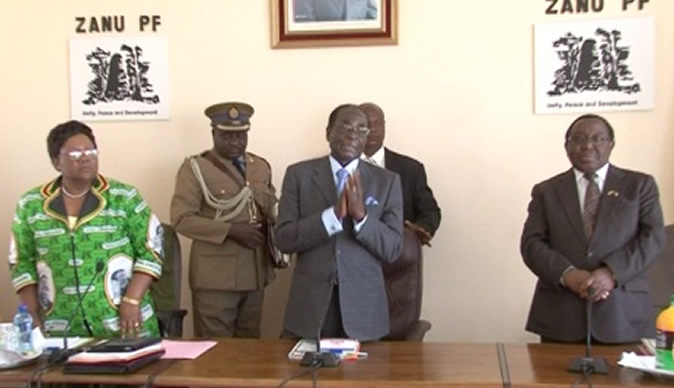


THE ruling ZANU-PF party, which is under extreme pressure to resolve a complex national crisis that is being fuelled by a tenuous liquidity situation is itself neck-deep in the throes of financial woes that speaks volumes about its capacity to deliver on its election promises. While the revolutionary party went into the 2013 elections sitting on a huge war chest that saw it splashing big on all-terrain 4×4 vehicles, expensive campaign regalia and advertising material, that season of plenty is gone.
The Financial Gazette can reveal that the party is running thin on resources, which might affect its preparations for the ZANU-PF elective congress due in December. The party’s Politburo was expected to receive a report on its congress preparations, amid indications that the corporate sector will once again be called in to support ZANU-PF’s fund raising efforts: That beside the point, the party has other pressing issues which are sticking out like a sore thumb.
For instance, the party has not paid its workers countrywide for the last two months and there is a possibility that it could be dragged before the courts for breaching labour regulations. The workers are now surviving on the goodwill of well-wishers as the appalling economic situation sweeping across all sectors sinks its teeth deep into the revolutionary party. ZANU-PF’s revenue comes in the form of donations, membership fees and subscriptions.
The party, being the dominant player in Zimbabwe, also gets the lion’s share of the funding made available through the Political Parties Finance Act. But due to the illiquid conditions prevailing locally, Treasury has been unable to release the funds to the eligible beneficiaries. Its rivals, the main wing of the Movement for Democratic Change led by Morgan Tsvangirai, the former Prime Minister, also revealed that they are still owed close to US$5 million.
Another source of funding for the party has been dividends from a cluster of companies in which it is invested. Unfortunately, most of its investments are hemorrhaging because of the difficult economic situation and have been unable, for a long time, to remit dividends to their shareholders. At some point, companies owned by ZANU-PF were the subject of an internal investigation after it was felt that mismanagement and other corporate ills could have been contributing to their poor performance.
With revenue sources thinning, the revolutionary party now owes its workers about US$190 000 in outstanding salaries. When contacted by telephone to explain the situation and give finer details on the matter, ZANU-PF’s secretary for administration Didymus Mutasa declined to comment saying he no longer talks to the media. “Why are you still bothering me? I have said it before that I do not speak to the press anymore. Get in touch with the party spokesman Rugare Gumbo, he will tell you what you want,” charged Mutasa.
Gumbo, however, referred the issue back to Mutasa. Workers at the ZANU-PF headquarters were tight lipped this week as they feared victimisation if they spoke to the press. They, however, confirmed that they last received their salaries in April. “It is true that we have not been paid for three months now but I cannot talk to you further than this. As workers we are under strict orders not to talk to the media. Please, do not mention that you spoke to me,” one employee said.
“It is true that party employees have gone for three months without receiving their salaries. The party is failing to raise the money to pay them and they are now restless,” said a party member who preferred to remain anonymous for security reasons. He said the situation was affecting employees at the party’s different offices dotted around the country but was more devastating at the national headquarters in Harare due to its bigger staff complement.
“I do not see the situation improving in the near future. It will take time before things go back to normal,” the member said. Analysts said the fact that ZANU-PF has a crisis in its own backyard which it is failing to resolve raises a lot of questions about its ability to address much bigger challenges confronting the national economy. For example, Zimbabwe’s debt is now estimated at about US$10 billion, which is twice its current Gross Domestic Product.
Unemployment remains unsustainably high, at more than 80 percent, spawned by company closures and the country’s inability to expand its production base. ZANU-PF has been brandishing its economic blueprint, the Zimbabwe Agenda for Sustainable Socio-Economic Transformation (Zim-Asset) as the manual that offers solutions to many of the country’s problems. Where the ruling party has struggled is to get the US$27 billion required to put Zim-Asset into action.
But while the party faces problems internally and nationally, there are accusations that those in the corridors of power have been insulated from the crisis. Ironically, Politburo members reportedly get huge sitting allowances whenever the party’s highest decision-making body meets to deliberate on party issues. According to the ZANU-PF constitution, the Politburo meets at least once per month but they have been meeting more frequently over the last few months as preparations for the crunch elective congress set for December this year gather momentum.
The Politburo last met yesterday (Wednesday) to deliberate on key sticky issues surrounding the confusion sparked by a raft of changes to guidelines that would govern elections at the youths and women’s congresses due next month and are seen as a decisive prelude to the December congress.
newsdesk@fingaz.co.zw